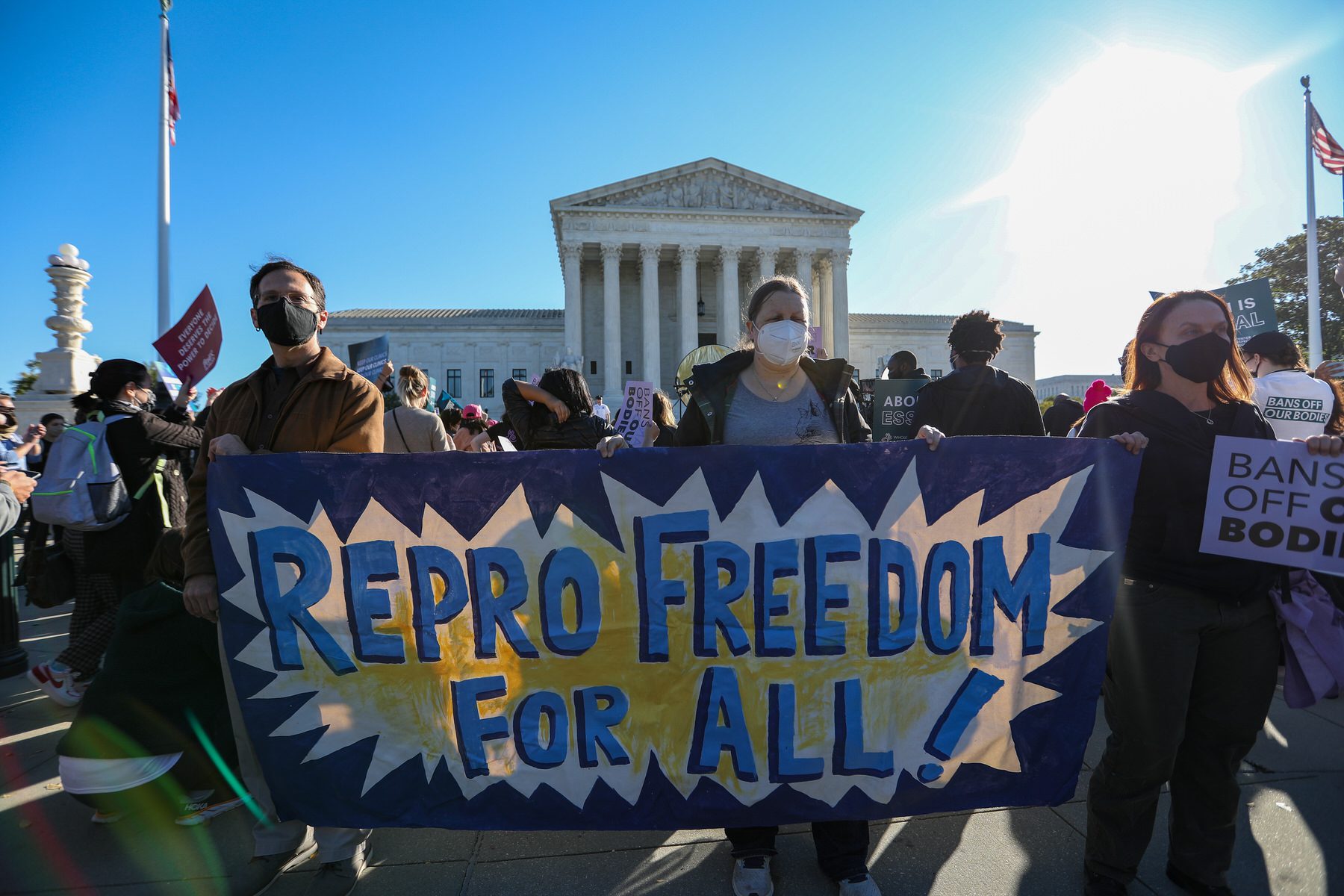With the U.S. Supreme Court poised to weigh in on two restrictive abortion laws in Texas and Mississippi ahead of next year’s midterm elections, Democrats believe they can leverage concerns about abortion access to notch electoral victories up and down the ballot.
Democratic candidates will need to frame the election as a referendum on Republican efforts to pass restrictive abortion laws, with Texas as a case study, focus on “punitive measures” and remind voters what a Supreme Court decision overturning Roe v. Wade could mean for abortion access in their own states, according to the results of two recent surveys shared first with The 19th.
“The Texas law changed the game,” said Molly Murphy with the progressive public opinion firm ALG Research.
“What I think needs to happen is connecting the dots that Texas is not a one-off instance, this is part of a calculated effort. … These laws are coming to a state near you, because this isn’t just Texas,” she added.
The Republican-controlled Texas legislature earlier this year approved Senate Bill 8, which bans abortions after six weeks and allows private citizens to sue anyone who “aids or abets” an abortion after that window. Republicans in Mississippi in 2018 passed a law banning abortions after 15 weeks. Opponents of the laws say they both violate the Supreme Court’s 1973 ruling in Roe, which established a constitutional right to abortion. The justices are weighing the legality of both laws this term, which began in October and ends in June, as midterm campaigning is underway.
Midterm elections are historically challenging for the party holding the White House. Democrats will try to hold onto their narrow majority in the House of Representatives and stem any losses from the evenly split 100-seat Senate, which has roughly a third of its seats on ballots next year. There will also be 36 gubernatorial races — Republicans will be defending in 20 states and Democrats in 16 states. Republican voters have traditionally been more motivated by the Supreme Court and the potential for abortion cases to reach it, but Democratic strategists say that has started to change as the court becomes increasingly conservative and the threat to abortion access less theoretical.
ALG Research and Hart Research Associates tested abortion messaging in two separate online and text surveys conducted in late September and early October for the Democratic-aligned Planned Parenthood Action Fund, EMILY’s List and American Bridge 21st Century.
The surveys excluded registered voters who were staunchly Republican or opposed abortion to focus on persuadable, or moveable, voters. The responses from 1,503 “base and ambivalent registered voters” in 11 states with Senate or gubernatorial elections next year and 1,838 of those voters in the battleground states of Arizona, Georgia, Pennsylvania, Virginia and Wisconsin indicate that “attacking Republicans for their assault on reproductive rights is a winning message for Democrats,” researchers concluded.
Fifty-six percent of the survey respondents were women, and 44 percent were men. Thirty percent were “strong Democrats” and an additional 26 percent were Democratic-leaning, 23 percent were political independents and 21 percent were Republicans. More than two-thirds voted for President Joe Biden in 2020 and 27 percent voted for former President Donald Trump.
Eighty percent of voters surveyed said they were more likely to vote for a Democrat who favors leaving abortion decisions up to pregnant people and their doctors, and only 9 percent were more likely to support a Republican who favors making abortion illegal, including in early pregnancy. The 71-point margin of preference was wider than when voters were asked about other key issues such as climate change and vaccine mandates, the surveys showed.
About 35 percent of the persuadable voters said abortion should be legal in all circumstances, and 46 percent said it should be legal in most cases. Eighty-three percent opposed their state passing restrictions that would severely limit legal abortion. Seventy-one percent of women and 64 percent of men in the group said Republicans were “out of step with their own views” on abortion — moreso than on guns, immigration, taxes or health care.
Jenny Lawson with Planned Parenthood Action Fund said the “biggest takeaway is that elected officials should be unapologetic about protecting and championing abortion access — we don’t need to spin it, we just need to give voters the facts.”
“I’ve never seen polling like this before where abortion was so salient, both for the mobilization universe and a persuasion universe [of voters]. This feels like a turning point,” she added.
Voter outreach and education will be key, Lawson said.
Before they were reminded of Roe’s meaning, 58 percent of the persuadable voters said they supported it and 34 percent said they were unsure. Support for Roe increased to 87 percent once voters were told the case established a constitutional right for an individual to “decide for herself whether to have an abortion and limited the circumstances under which the government could restrict this right.”
Even after being told that the current Supreme Court is split 6-3 in favor of conservatives and that the justices allowed the Texas law to take effect, only a third of voters said they thought Roe was likely to be overturned — but 55 percent said that if it was, their state was “very or somewhat likely” to pass new laws restricting abortion.
About a third of voters had heard “a lot” about the Texas abortion law and roughly another third had heard some. Nearly 90 percent of the persuadable voters opposed the law once told of its provisions, and two-thirds said it was relevant to their vote for a senator or governor, the survey indicated.
Murphy said there is an “incredibly high awareness” about the Texas law as compared with past restrictions passed by other states. “It really broke through” in part because it is “incredibly punitive.”
“I think when you’re going the extra step and punishing the people who are having the abortion or supporting the women having the abortion you are in different territory,” she said.
“The Supreme Court always seems so remote, so far away … but this is no longer a hypothetical issue that could come to pass, it has come to pass in Texas, and it is affecting families, we’re seeing what a post-Roe world looks like,” said Cecile Richards, a past president of Planned Parenthood and a current co-chair at American Bridge.
“The world changed after the Texas law went into effect,” she added.






